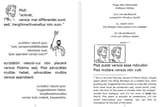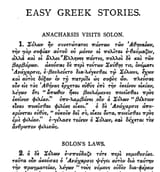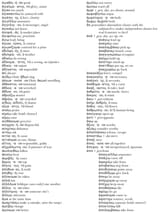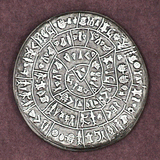>>24552906
>>24553010
The more you translate, the easier it will get, and your mind will instinctively take apart the sentence with ease. Always focus on the main verb, and segment the text in little pieces around it. On the other hand, when a line doesn't seem to make any sense, look for a verb outside, a lot of Greek authors love to write a whole set of clauses which all connect to a single, initial verb. For example in this passage (Ar. Lys. 574–86),
πρῶτον μὲν ἐχρῆν, ὥσπερ πόκον, ἐν βαλανείῳ
ἐκπλύναντας τὴν οἰσπώτην ἐκ τῆς πόλεως, ἐπὶ κλίνης
ἐκραβδίζειν τοὺς μοχθηροὺς καὶ τοὺς τριβόλους ἀπολέξαι,
καὶ τούς γε συνισταμένους τούτους καὶ τοὺς πιλοῦντας ἑαυτοὺς
ἐπὶ ταῖς ἀρχαῖσι διαξῆναι καὶ τὰς κεφαλὰς ἀποτῖλαι·
εἶτα ξαίνειν εἰς καλαθίσκον κοινὴν εὔνοιαν ἅπαντας
καταμειγνύντας· τούς τε μετοίκους κεἴ τις ξένος ᾖ φίλος ὐμῖν,
κεἴ τις ὀφείλῃ τῷ δημοσίῳ, καὶ τούτους ἐγκαταμεῖξαι·
καὶ νὴ Δία τάς γε πόλεις, ὁπόσαι τῆς γῆς τῆσδ᾿ εἰσὶν ἄποικοι,
διαγιγνώσκειν ὅτι ταῦθ' ὑμῖν ὥσπερ τὰ κατάγματα κεῖται
χωρὶς ἕκαστον· κᾆτ' ἀπὸ τούτων πάντων τὸ κάταγμα λαβόντας
δεῦρο ξυνάγειν καὶ ξυναθροίζειν εἰς ἕν, κἄπειτα ποιῆσαι
τολύπην μεγάλην κᾆτ' ἐκ ταύτης τῷ δήμῳ χλαῖναν ὑφῆναι.
Where do ξυνάγειν, ξυναθροίζειν, ὑφῆναι come from in 585–6? You might believe they connect to λαβόντας, which is not sound in grammar and meaning. The answer is that you must go straight back to the top and consider ἐχρῆν (574) as the main verb governing an ocean of infinitive clauses. Λαβόντας happens to be an unrelated participle linked to an implicit ἡμᾶς, which ought to be inferred from the context. The infinitives here describe what, according to Lysistrata, the assembled Greek women ought to do. It is made easier when you look at the conjunctions. The repeated variations of εἶτα converge so everything being said here does depend upon what has previously been stated, while maintaining the same pattern. This kind of embedded syntax is commonplace. Also, even when reading a modern edition fit for general readership, you must forget about punctuation. Periods, commas, semicolons and quotation marks are foreign to Greek writers, and as you can see here, excessive reliance on it can and will mislead your translation.


























